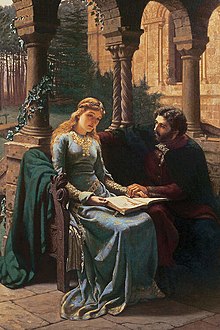Eloisa to Abelard
poem by Alexander Pope
Eloisa to Abelard (1717) is a poem by Alexander Pope. It is an Ovidian heroic epistle inspired by the 12th-century story of Héloïse's illicit love for, and secret marriage to, her teacher Pierre Abélard, perhaps the most popular teacher and philosopher in Paris, and the brutal vengeance that her family exacts when they castrate him, even though the lovers had married.

Still breathed in sighs, still ushered with a tear.

Lost in a convent's solitary gloom!



Quotes
edit- Oh name forever sad! forever dear!
Still breathed in sighs, still ushered with a tear.- Line 31.
- Now warm in love, now with'ring in my bloom,
Lost in a convent's solitary gloom!- Line 37.
- Heaven first taught letters for some wretch's aid,
Some banish'd lover, or some captive maid,
They live, they speak, they breathe what love inspires,
Warm from the soul, and faithful to its fires,
The virgin's wish without her fears impart,
Excuse the blush, and pour out all the heart,
Speed the soft intercourse from soul to soul,
And waft a sigh from Indus to the Pole.- Line 51.
- Guiltless I gaz'd; heav'n listen'd while you sung;
And truths divine came mended from that tongue.- Line 65.
- How oft, when press'd to marriage, have I said,
Curse on all laws but those which love has made!
Love, free as air at sight of human ties,
Spreads his light wings, and in a moment flies.- Line 73.
- Let wealth, let honour, wait the wedded dame,
August her deed, and sacred be her fame;
Before true passion all those views remove,
Fame, wealth, and honour! what are you to Love?- Line 77.
- No, make me mistress to the man I love;
If there be yet another name more free,
More fond than mistress, make me that to thee!- Line 88.
- Not grace, or zeal, love only was my call,
And if I lose thy love, I lose my all.- Line 117.
- I view my crime, but kindle at the view,
Repent old pleasures, and solicit new;
Now turn'd to heav'n, I weep my past offence,
Now think of thee, and curse my innocence.
Of all affliction taught a lover yet,
'Tis sure the hardest science to forget!
How shall I lose the sin, yet keep the sense,
And love th' offender, yet detest th' offence?
How the dear object from the crime remove,
Or how distinguish penitence from love?
Unequal task! a passion to resign,
For hearts so touch'd, so pierc'd, so lost as mine.
Ere such a soul regains its peaceful state,
How often must it love, how often hate!
How often hope, despair, resent, regret,
Conceal, disdain,—do all things but forget.- Line 185; similar here to "She hugg'd the offender, and forgave the offence", John Dryden, Cymon and Iphigenia, line 367.
- Fill my fond heart with God alone, for he
Alone can rival, can succeed to thee.- Line 205.
- How happy is the blameless vestal's lot!
The world forgetting, by the world forgot.
Eternal sunshine of the spotless mind!
Each pray'r accepted, and each wish resign'd...- Line 207.
- One thought of thee puts all the pomp to flight,
Priests, tapers, temples, swim before my sight.- Line 273. Compare: "Priests, altars, victims, swam before my sight", Edmund Smith, Phædra and Hippolytus, act i. sc. 1.
- See my lips tremble and my eyeballs roll,
Suck my last breath, and catch my flying soul.- Line 323.
- Condemn'd whole years in absence to deplore,
And image charms he must behold no more,
Such if there be, who loves so long, so well;
Let him our sad, our tender story tell;
The well-sung woes will sooth my pensive ghost;
He best can paint them, who shall feel them most.- Lines 361-366; The last line here is probably inspired by that Joseph Addison in The Campaign (1704): "And those that paint them truest praise them most".
About
edit- [It] excelled every composition of the same kind. The mixture of religious hope and resignation gives an elevation and dignity to disappointed love, which images merely natural cannot bestow. The gloom of a convent strikes the imagination with far greater force than the solitude of a grove.
- Samuel Johnson, The Life of Pope (1781).
See also
edit- Eternal Sunshine of the Spotless Mind, which takes its title from the poem